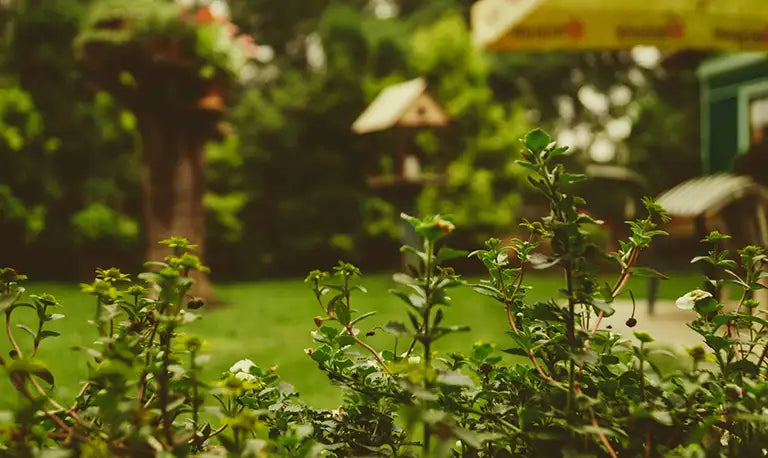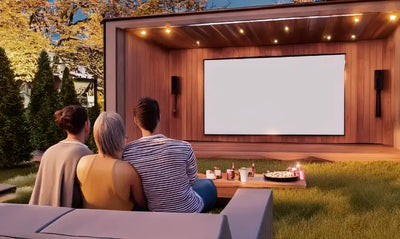
Garden Laws: The Dos and Don’ts
After paying thousands of pounds to call a place your home, it’s only natural to start thinking that your garden is yours to do whatever you like. Building a structure? Why not. Holding an evening party? Sure. However, the reality is not as cut and dry.
From planning permission to noise pollution, our gardens are subject to a multitude of rules and regulations in the UK. For the most part, these aspects tend to get overlooked during the sale of a house, with buyers tending to be more attentive towards the bricks and mortar portion of the property. However, it does help to know exactly what your rights are.
So, we’ve taken a look at some of the legislation to give you a list of things you can and can’t do in your garden.
Do: Seek Planning Permission on Permanent Structures

There is a slight misunderstanding with planning permission and gardens, as there are very strict laws depending on the permanency of the structure.
Temporary structures that are built on top of existing land, like sheds or pagodas do not count towards planning permission requests as they can be removed with ease and do not impact the value of the property. Structures like garages and extensions, however, do.
To put it simply, some sheds may not require a planning permission request, but constructing a building that is fixed in place or attached to an existing one, does.
To get an idea of whether you’ll need to apply for planning permission, try to imagine taking your new structure with you to another house. Would it require major alterations to the ground? Would it destroy parts of your garden in the process of removal? If so, you probably need planning permission to construct it.
With this in mind, you’re probably wondering what size garden room you can build without planning permission. To which, the answer is… as long as you comply with the usual rules of planning permission, there are no size regulations as these structures are classed as outbuildings.
Don’t: Play Loud Music Beyond 11PM
Noise times in residential areas are always a bit shaky, as some believe there to be some subjectivity surrounding what is and isn’t a disturbance.

Thankfully, noise pollutions are clearly defined in the law with time-based parameters. As a general rule of thumb, garden noise law claims that excessive noise like loud music or the use of power tools shouldn’t last between 11pm to 7am. Failing to abide by this may result in your neighbours submitting noise complaints against you to the local council, landing you with a sizable fine.
Do: Trim Hedges Up To Your Property Line
When buying a home, your solicitor should have informed you of the surrounding boundary that counts as your property. This is defined in the land registry database and stipulates where a property starts and ends.
Often, homeowners will install fences or hedges to create privacy around these borders. However, when doing this, it’s important to ensure that these borders are properly maintained. When doing your maintenance, make sure you stick to what’s yours and no further. It is quite common for neighbours to emulate whatever look you’re going for with your border, so just be sure to not do anything that would impact their property, as this could be seen as trespassing and intentional damage.
Don’t: Allow Waste Trimmings To Fall In Your Neighbour’s Garden
So, you’ve just trimmed your surrounding hedge and your garden is now back to its former glory. While things may look great, it’s highly advised that you do a quick visual inspection of the mess you’ve left behind.
If any tree branches or leaves fall down into your neighbour’s garden, this could be seen as fly tipping. While this may not sound like an extreme offense, the fines associated with it can add up very quickly.
To make your life easier, consider reaching out to your neighbour before doing any maintenance work. They may even agree to let you step into their garden and conduct your work from there so that any waste ends up in your garden, not theirs.
Do: Inspect Your Garden’s Perimeter

As a due diligence check, it helps to know exactly what land you’re entitled to. Often, buyers will visit a property, view the bordering fences and simply assume that everything checks out. Though, in some circumstances, you may find that your neighbours are beginning to encroach on to your land which, if left unnoticed, can eventually mean that the land ends up in their possession.
All your neighbour has to do is stake some physical claim on the land, be it an embedded piece of wood or a simple space infraction, is to make an application to the land registry for ownership of that space of land.
Don’t: Block Natural Light to Windows
The 1959 Right of Light act stipulates that windows that have received more than 20 years of natural light should not be interfered with by the building of new structures or other obstructions. Such things are classified as a light obstruction and can be ordered to be torn down or amended to rectify the infraction.
As with all laws, there are some caveats to this, including whether or not the obstruction is protected under a preservation order. This means your neighbours can’t just one day decide to go hail Mary on your possessions simply because it blocks their window’s natural light.
Do: Avoid Excessive Smoke From Barbecues And Bonfires
We all love a good barbecue. Gathering friends and family together for laughs, drinks and good food is a lovely experience. However, do spare a thought for your surrounding neighbours when having your parties.
While there are no laws that directly prohibit the use of a barbecue or fire pit, if things regularly get out of hand with excessive smoke and smells, things could begin to verge towards being what’s called a “statutory nuisance”.
A statutory nuisance is basically anything that prevents your neighbours from enjoying their property without disturbance. Things like loud music and dogs barking can class as a statutory nuisance, even if played within the legal hours, and so can barbecue smoke.
Don’t: Install Trampolines That Invade Privacy

We all have a basic right to privacy, as governed under article 8 of the Human Rights act. This includes being able to live our lives without being subjected to prolonged observation by others, something that usually goes unnoticed with things like trampolines.
While trampolines are a necessity for summertime activities, they do pose a serious privacy risk thanks to wandering eyes. If your kids are regularly found to be spying on your neighbours through the use of a trampoline, they may begin to feel like their privacy has been infringed and may take action based on article 8.
When installing your trampoline, consider having it recessed into the ground slightly to reduce the overall height and restore privacy to your neighbour’s garden.
Make the Most Of Your Garden
While legal red tape exists to try and regulate how much we enjoy our gardens, you shouldn’t let it hold you back. Planning permission requests can be lengthy, so why not make an immediate impact on your garden with some new garden furniture?
Have a browse through all the ranges we have available and start transforming your garden, today.
Related Articles
 Pizza Oven Buyer's Guide: Which is Best For You?
Pizza Oven Buyer's Guide: Which is Best For You?
 The Best Quality Rattan Garden Furniture Sets
The Best Quality Rattan Garden Furniture Sets
 What to Consider When Building an Outdoor Kitchen
What to Consider When Building an Outdoor Kitchen
 What is the Best Shape for a Garden Parasol?
What is the Best Shape for a Garden Parasol?
 10 Years of the Palma Collection
10 Years of the Palma Collection
 Hosting a Garden Brunch: Menu and Décor Ideas
Hosting a Garden Brunch: Menu and Décor Ideas
 How to Make an Outdoor Cinema
How to Make an Outdoor Cinema
 Embrace The Cottage Lifestyle
Embrace The Cottage Lifestyle















































